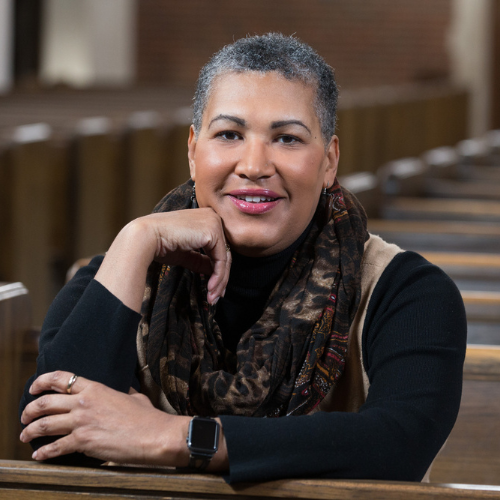It might seem advantageous that this Sunday’s text is about an exchange between a lawyer and God’s Son. Oh the places we could go! The U.S. Supreme Court alone has provided a wealth of material in just the past week. A few more news reels of celebrity court cases and yet another holiday weekend of live video feeds capturing the consequences of continued gun violence, followed by talking heads whose words are no less destructive.
Turn off the screen and, whether at the dining room or the communion table, we are likewise hot under the collar as we bake and pour, preparing the table for the family to share a common meal (all puns intended).
It is the seventh month of the second year in the third decade of the 21st century after the reports of Jesus’ resurrection changed humanity’s understanding of the world. And still, the disruption throughout creation is immeasurable. Verbal vitriol. Vain violence. Vacuous vows. Moments of celebration spoiled by cruelty, constitution, or cancellation. Even the old disorders abound: war, famine, disease.
If we are indeed trying to “see Christ” in one another, most every one of us has become the lawyer, approaching “Jesus” with a test question. In our mind, like the lawyer, having the right answer is insufficient because we desire to justify ourselves. In so doing we safeguard both our righteousness and the righteousness of others. Right? So, dear Working Preacher, that’s where we, like Jesus, can tell a story.
Those who know me know I like this telling of stories. Stories provide a way to invite listeners to lean in and all but ask you to say more. Stories slow us down to get the details that undergird differing opinions. Stories are the style that allows the provision of the most substance. The story Jesus tells the lawyer (and those among the crowd listening) provides as much information on style as it does on substance. Make it plain, but I invite you to tell the story slant. By slant I mean keeping to details consistent with the reality, but like a TikTok influencer setting us up for the laugh (or Nathan setting David up for the confession) tell the story so the listener’s own values bring the indictment. In a verbal judo-styled defense, Jesus doesn’t say who the neighbor is, the lawyer does.
In our nonstop access to events headlining global news, the temptation is to assert the answer, provide the principle, give the questioner the response they seek—often one that traps the responder. By now we should expect Jesus to turn the tables on his interrogator. The power of this story comes from implications that would not be lost on its first-century audience. I wonder if we should reframe the message, thereby enabling our audience to hear something that causes today’s listeners to scratch their head in assessment more than nod in agreement.
For one, I am captivated that the innuendo in this passage may not be about us at all—whether we are the lawyer or the Samaritan, the priest, or the Levite, or even the robbers or the wounded one. What if the story, like most of the witness of the Gospels, is about who is Jesus?
The one despised and rejected and condemned and publicly lynched is the one who raises us up from the pit, binds up our wounds, takes us to a place of safety and provides a place for us where we belong, promising to return to ensure all debts have been paid. Jesus does not just speak a good word, or point us in the right direction, Jesus takes us to the place where we can be cared for and returns to confirm that all is in order. If we are to be Christlike (Christian), this is who we must imitate. As we grow in knowledge of him, we lead lives worthy of the him, bearing fruit in every good work (Colossians 1:10). This is not a promise of heaven to come, but the presence of God’s reign experienced here and now.
The Deuteronomy passage captures it well: the word is very near to you; it is in your mouth and in your heart for you to observe (Deuteronomy 30:14). Observing is not merely hoping to see it happen somewhere, it is receiving the instruction (commandment) Jesus gave to the lawyer: go and do likewise.
Again, the first reading provides a key principle: “This commandment … is not too hard for you, nor is it too far away. It is not in heaven, that you should say, ‘Who will go up to heaven for us, and get it for us so that we may hear it and observe it?’” (Deuteronomy 30:11-12). The expectation of the people of God from Ancient Israel to the present-day followers of Jesus is to live lives in such a way that others do not experience misery. It’s what Jesus did.
And that becomes our challenge in the day-to-day cries for justice, protests for policies of equality, and commitments to change. I can’t tell you what is good for you. Today, the displaced Ukrainian has a different need than a Highland Park parade attender. Those in Akron, Ohio, are needing more than what has happened in Ferguson, Charlotte, Minneapolis, or Baltimore. I, for one, can’t tell you what your good life is. But I have some idea of what might reduce your misery. Justice isn’t my inheriting some promise of immortality. Justice is everyone, anywhere having the opportunity to be healed, find their home, and experience the peace God promises in this lifetime.
Rather than provide another promise or offer the correct response, may this weekly gathering of the wounded and wandering become an opportunity to convert our imagination to living individually the characteristics we long for collectively. More than bumper-stickers regarding who to vote for in November, become a trusted neighbor who enables even those who disagree with you to lean in and say, I think I want more of the kind of person I see in you. As you prepare for the Fifth Sunday after Pentecost the need for a living word is as urgent as it has ever been. We need a way of “telling the world” that does not leave us stuck in the chaos and confusion that haunt our existence. A telling that does not halt our hope. A perspective that delivers on the promise of lasting peace.
Working Preacher, we need a word from God this week. So, as you prepare to respond to the most well-read member of your community, remember the eavesdropping crowd from which they stood to speak. As you focus on setting the plumb line do not forget the same passage previews the impending death, yet coming exile, and less than ideal circumstances for the very household of God’s chosen. You see, Working Preacher, we need comforting this week.
Because it is in knowing the one God sent that we inherit eternal life.
Joy

